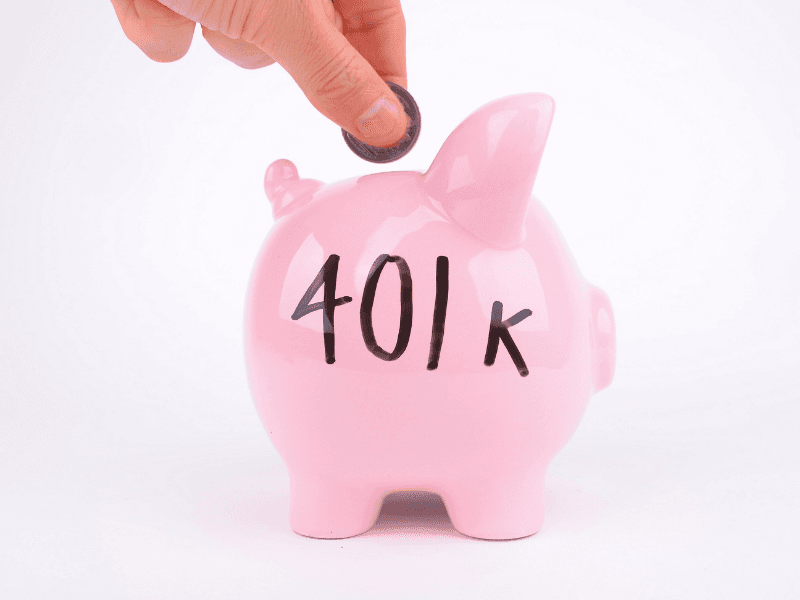
Can I Use My 401(k) to Buy a House?
What are the rules for using your 401(k) to buy a home?
The down payment and closing costs associated with buying a home are among the biggest barriers to homeownership. Many people can afford the monthly mortgage payment, but the upfront costs pose a more significant challenge.
A common question that people ask is, “Can I use my 401(k) to buy a house?”
The short answer is, yes, you can. However, this is a big decision that has serious financial ramifications, so you’ll want to be sure you understand all the details before moving forward.
Although you can use your 401(k) to buy a house, that doesn’t mean that you should. In most cases, taking money from your retirement savings before you’ve reached retirement age is a bad decision. But everyone’s situation is unique, and there are some compelling reasons why you might want to consider this option.
Let’s take a detailed look at the topic so you can decide if it’s the right move for you.
Summary of the Key Points:
- There are two ways to get money out of your 401(k) early: a withdrawal or a loan.
- Early withdrawals from a 401(k) are subject to penalties and income taxes.
- Under the CARES Act, the penalties are waived in certain situations.
- 401(k) loans are not subject to income taxes or penalties, but the loan must be repaid with interest.
- The biggest drawback of taking money out of your 401(k) for a house is that you’ll damage your retirement savings.
- There are alternatives that are usually better options.
401(k) Overview
It’s helpful to start this discussion with a quick overview of 401(k) plans and how they work. A 401(k) plan is an employer-sponsored retirement plan with tax incentives. If your employer offers a 401(k), you can elect to have a portion of each paycheck deposited into your account automatically. Your contributions will reduce your taxable income, which in turn reduces the income taxes you owe.
The general rules prevent withdrawals before the age of 59.5, or 55 if you get laid off, fired, or quit your job. To be able to withdraw at 55, you’ll need to work at least until the year of your 55th birthday. Withdrawals that are made after age 59.5 (or 55 if you qualify) will be subject to income tax, but no penalties.
Early withdrawals are subject to a 10% penalty of the amount taken out of the 401(k), as well as income taxes. Additionally, early withdrawals are considered “hardship withdrawals” and you must prove a hardship in order to get the money. Generally, using the money to buy a primary residence will qualify for hardship.
Rules About Using a 401(k) for a Down Payment
Now, let’s dive into the details about how you can use retirement savings from your 401(k) to buy a house, as well as the ramifications.
Withdrawing from Your 401(k)
The first option is to take an early withdrawal from your 401(k) and use that money for a down payment. Typically, you’ll get approval for the hardship if you’re using the money to buy a house, but there are no black and white rules about what qualifies as a hardship.
Generally, early withdrawals from your 401(k) are not a good idea. As an example, let’s say you withdraw $30,000 to use as a down payment. Immediately, you’ll lose $3,000 to penalties (10% of the amount withdrawn). You’ll also have to pay income taxes, which will probably amount to about $6,000 - $8,000. So the $30,000 that you withdraw could leave you with only $19,000 - $21,000 that you can actually use for the down payment.
What’s even more significant in the long term is the impact it will have on your retirement savings. If you’re currently 30 years old, that $30,000 could be worth $230,583 when you’re 65 years old, assuming only an average annual return of 6%. With a return of better than 6%, the number gets even more significant.
As you can see, withdrawing money from your retirement savings is not a decision that should be taken lightly.
CARES Act
The Coronavirus Aid, Relief and Economic Security (CARES) Act, passed in 2020, includes a provision that impacts 401(k) withdrawals. Under the CARES Act, anyone who has been adversely impacted by the pandemic can withdraw up to $100,000 or 100% of their vested 401(k) balance without being subject to the 10% penalty. The withdrawal is still subject to income taxes, but the tax on the withdrawal is spread out over three years to reduce the immediate impact
401(k) Loans
If you’re going to take money from your 401(k) to use for a house, a loan is generally preferable to a withdrawal. The downside is that not all employers and 401(k) plans offer loans, so it may or may not be an option for you.
Unlike early withdrawals, 401(k) loans are not subject to penalties and income taxes. However, you do need to pay the loan back by putting money into the 401(k). The maximum loan term is typically five years, and interest rates on 401(k) loans are generally pretty low.
One significant downside is that 401(k) loans are capped at $50,000 or 50% or your vested balance, whichever is less. If you live in an area with high property values or if you haven’t been working long enough to build up a sizable 401(k) balance, you may not be able to get enough from the loan to meet your needs for a downpayment.
Pros and Cons of Using Your 401(k) to Buy a House
Now that we’ve looked at the two options, let’s consider the pros and cons of using part of your retirement savings to buy a house.
Pros:
- Using your 401(k) may allow you to buy a home when it wouldn’t be possible otherwise.
- The CARES Act removes the 10% penalty for early withdrawals (if you qualify), which reduces the sting.
- Borrowing from your 401(k) is essentially borrowing from yourself, so your interest payments will be going to your own account.
Cons:
- Penalties and income taxes may significantly reduce the amount of money you can actually use.
- Taking money from your 401(k), whether it’s a loan or early withdrawal, will do permanent damage to your retirement savings. You’ll miss out on the compound interest of that money.
- Repayments of 401(k) loans will not qualify for an employer match, so you’ll be missing out on free money.
- There are limitations to how much you can take out.
Alternatives to Using Your 401(k) for a Down Payment
If you’ve decided that using money from your 401(k) for a down payment is not ideal, you may be wondering what other options are available. Here are a few to consider.
VA Loan
For those who qualify (active service member, veteran, or spouse), VA loans are often the best type of mortgage available. These are government-back loans with low interest rates and the ability to purchase a home with 0% down.
See our VA loan calculator.
FHA Loan
Another type of government-backed loan is the FHA loan. Designed to make homeownership possible for a greater number of Americans, FHA loans offer low down payment options and don’t require perfect credit. If your credit score is 580 or higher, you can put as little as 3.5% down.
See our FHA loan calculator.
USDA Loan
USDA loans are available to homebuyers in certain rural areas and allow homes to be purchased with no down payment.
See our USDA loan calculator.
Conventional Loan
If you have solid credit, a conventional mortgage may be a good option. With a score of at least 620, you may qualify for a loan through Fannie Mae or Freddie Mac that requires only a 3% down payment.
See our conventional mortgage calculator.
Private Loan
It’s possible that you have family members or friends who would be willing to give you a private loan to get the money needed for a down payment and closing costs.
IRA
Individual Retirement Accounts (IRAs) include a provision that allows first-time homebuyers to withdraw up to $10,000 with no penalties. You’ll be considered a first-time homebuyer if you haven’t owned a home in the past two years.
Taking money from an IRA is not ideal long-term because you’re still reducing the amount you have for retirement. However, if you need less than $10,000, taking money from an IRA is usually a better option than getting it from your 401(k).
Final Thoughts
Coming up with the money for a down payment can be difficult, especially for first-time homebuyers. While using money from your 401(k) is an option, it’s rarely the best choice. The long-term impact of taking money out of your retirement savings should not be overlooked.
The opinions expressed in this article are for general information purposes only and are not intended to provide specific advice or recommendations about any investment product or security. This information is provided strictly as a means of education regarding the financial industry.


![What is Earnest Money? [Everything You Need to Know in 2025]](/_next/image/?url=https%3A%2F%2Fs3-us-west-2.amazonaws.com%2Fwhatsmypayment.com%2Fcontent%2Fimages%2F2024%2F09%2FEarnest-Money.jpeg&w=3840&q=75)







